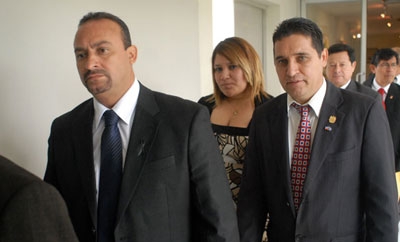The main witness in the case against a major drug trafficker and his network in El Salvador has appeared in court and photographically identified a congressman linked to the organization, a development that may force authorities to act against corrupt politicians involved in the operation.
Salvadoran drug trafficker Jorge Ernesto Ulloa Sibrian, alias “Repollo,” was captured in Guatemala in March and deported to El Salvador. He allegedly headed a network that spanned Central America and trafficked some 10 tons of cocaine to the United States, and is thought to have operated for years under official protection.
SEE ALSO: El Salvador News and Profiles
The main witness in his trial identified Congressman Wilver Alexander Rivera Monge in a photograph before a judge, pointing to him as a person who laundered money and provided vehicles for the network, reported El Faro. He said the official provided and altered a vehicle for trafficking cocaine on Repollo’s orders in 2007. The witness also said he personally saw Rivera Monge perform these activities.
The witness’ identification of the congressman out of a set of six similar photographs served as verification of an earlier statement he made incriminating Rivera.
InSight Crime Analysis
In April, journalistic investigations revealed that Salvadoran police records indicated Rivera had been part of Repollo’s drug trafficking network since 2004. Evidence implicated Rivera, the owner of a used car lot, as the provider of the vehicle used by Repollo in a 2007 drug trafficking operation. He was also found to have engaged in financial transactions linked to money laundering.
Despite these records, and previous statements by the witness, no arrest warrant has been issued for the congressman, who serves as an alternate for congressman Reynaldo Cardoza, himself suspected of ties to another drug trafficking group, the Texis Cartel.
The latest development could be an important step towards bringing down the corrupt network of officials thought to have supported Repollo’s structure, as the court statement will be hard to ignore despite the Attorney General’s Office’s evident reluctance to investigate the congressman.
Links with corrupt politicians are a common theme in Salvadoran drug trafficking: major criminal structures the Perrones and the Texis Cartel are also believed to have political connections at various levels of government. Recent arrests have shown some political will to begin closing in on these structures, but investigators will have to overcome significant obstacles if they are to obtain convictions.

